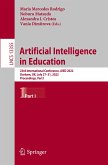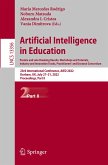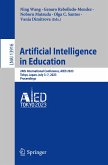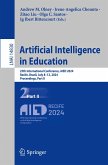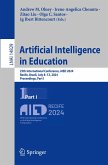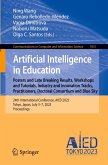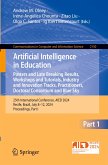Innovative Technologies and Learning
7th International Conference, ICITL 2024, Tartu, Estonia, August 14-16, 2024, Proceedings, Part I
Herausgegeben:Cheng, Yu-Ping; Pedaste, Margus; Bardone, Emanuele; Huang, Yueh-Min
Innovative Technologies and Learning
7th International Conference, ICITL 2024, Tartu, Estonia, August 14-16, 2024, Proceedings, Part I
Herausgegeben:Cheng, Yu-Ping; Pedaste, Margus; Bardone, Emanuele; Huang, Yueh-Min
- Broschiertes Buch
- Merkliste
- Auf die Merkliste
- Bewerten Bewerten
- Teilen
- Produkt teilen
- Produkterinnerung
- Produkterinnerung
The two-volume set LNCS 14785 and 14786 constitutes the refereed post-conference proceedings of the 7th International Conference on Innovative Technologies and Learning, ICITL 2024, Tartu, Estonia, during August 14 -16, 2024.
The 60 full papers included in this book were carefully reviewed and selected from 131 submissions. They were organized in topical sections as follows:
Part One : Artificial Intelligence in Education; Computational Thinking in Education; Design and Framework of Learning Systems and Pedagogies to Innovative Technologies and Learning.
Part Two : STEM/STEAM…mehr
Andere Kunden interessierten sich auch für
![Artificial Intelligence in Education Artificial Intelligence in Education]() Artificial Intelligence in Education93,99 €
Artificial Intelligence in Education93,99 €![Artificial Intelligence in Education. Posters and Late Breaking Results, Workshops and Tutorials, Industry and Innovation Tracks, Practitioners¿ and Doctoral Consortium Artificial Intelligence in Education. Posters and Late Breaking Results, Workshops and Tutorials, Industry and Innovation Tracks, Practitioners¿ and Doctoral Consortium]() Artificial Intelligence in Education. Posters and Late Breaking Results, Workshops and Tutorials, Industry and Innovation Tracks, Practitioners¿ and Doctoral Consortium77,99 €
Artificial Intelligence in Education. Posters and Late Breaking Results, Workshops and Tutorials, Industry and Innovation Tracks, Practitioners¿ and Doctoral Consortium77,99 €![Artificial Intelligence in Education Artificial Intelligence in Education]() Artificial Intelligence in Education93,99 €
Artificial Intelligence in Education93,99 €![Artificial Intelligence in Education Artificial Intelligence in Education]() Artificial Intelligence in Education57,99 €
Artificial Intelligence in Education57,99 €![Artificial Intelligence in Education Artificial Intelligence in Education]() Artificial Intelligence in Education62,99 €
Artificial Intelligence in Education62,99 €![Artificial Intelligence in Education. Posters and Late Breaking Results, Workshops and Tutorials, Industry and Innovation Tracks, Practitioners, Doctoral Consortium and Blue Sky Artificial Intelligence in Education. Posters and Late Breaking Results, Workshops and Tutorials, Industry and Innovation Tracks, Practitioners, Doctoral Consortium and Blue Sky]() Artificial Intelligence in Education. Posters and Late Breaking Results, Workshops and Tutorials, Industry and Innovation Tracks, Practitioners, Doctoral Consortium and Blue Sky100,99 €
Artificial Intelligence in Education. Posters and Late Breaking Results, Workshops and Tutorials, Industry and Innovation Tracks, Practitioners, Doctoral Consortium and Blue Sky100,99 €![Artificial Intelligence in Education. Posters and Late Breaking Results, Workshops and Tutorials, Industry and Innovation Tracks, Practitioners, Doctoral Consortium and Blue Sky Artificial Intelligence in Education. Posters and Late Breaking Results, Workshops and Tutorials, Industry and Innovation Tracks, Practitioners, Doctoral Consortium and Blue Sky]() Artificial Intelligence in Education. Posters and Late Breaking Results, Workshops and Tutorials, Industry and Innovation Tracks, Practitioners, Doctoral Consortium and Blue Sky70,99 €
Artificial Intelligence in Education. Posters and Late Breaking Results, Workshops and Tutorials, Industry and Innovation Tracks, Practitioners, Doctoral Consortium and Blue Sky70,99 €-
-
-
The two-volume set LNCS 14785 and 14786 constitutes the refereed post-conference proceedings of the 7th International Conference on Innovative Technologies and Learning, ICITL 2024, Tartu, Estonia, during August 14 -16, 2024.
The 60 full papers included in this book were carefully reviewed and selected from 131 submissions. They were organized in topical sections as follows:
Part One : Artificial Intelligence in Education; Computational Thinking in Education; Design and Framework of Learning Systems and Pedagogies to Innovative Technologies and Learning.
Part Two : STEM/STEAM Education; VR/AR/MR/XR in Education; and Application and Design of Generative Artificial Intelligence in Education.
The 60 full papers included in this book were carefully reviewed and selected from 131 submissions. They were organized in topical sections as follows:
Part One : Artificial Intelligence in Education; Computational Thinking in Education; Design and Framework of Learning Systems and Pedagogies to Innovative Technologies and Learning.
Part Two : STEM/STEAM Education; VR/AR/MR/XR in Education; and Application and Design of Generative Artificial Intelligence in Education.
Produktdetails
- Produktdetails
- Lecture Notes in Computer Science 14785
- Verlag: Springer / Springer Nature Switzerland / Springer, Berlin
- Artikelnr. des Verlages: 978-3-031-65880-8
- 2024
- Seitenzahl: 348
- Erscheinungstermin: 21. Juli 2024
- Englisch
- Abmessung: 235mm x 155mm x 19mm
- Gewicht: 528g
- ISBN-13: 9783031658808
- ISBN-10: 3031658809
- Artikelnr.: 70940433
- Herstellerkennzeichnung Die Herstellerinformationen sind derzeit nicht verfügbar.
- Lecture Notes in Computer Science 14785
- Verlag: Springer / Springer Nature Switzerland / Springer, Berlin
- Artikelnr. des Verlages: 978-3-031-65880-8
- 2024
- Seitenzahl: 348
- Erscheinungstermin: 21. Juli 2024
- Englisch
- Abmessung: 235mm x 155mm x 19mm
- Gewicht: 528g
- ISBN-13: 9783031658808
- ISBN-10: 3031658809
- Artikelnr.: 70940433
- Herstellerkennzeichnung Die Herstellerinformationen sind derzeit nicht verfügbar.
.- Artificial Intelligence in Education.
.- Investigating the Impact of Integrating Prompting Strategies in ChatGPT on Students Learning Achievement and Cognitive Load .
.- Tutor-bot: A Question-Answering Educational Robot based on Deep Learning.
.- Capacity for the Usage of Disruptive Technologies in Higher Education.
.- Enhancing ChatGPT in POE Inquiry Learning for STEM Education to Improve Critical Thinking Skills.
.- Personalisation is Not Guaranteed: The Challenges of Using Generative AI for Personalised Learning.
.- ChatGPT Assessment Design for Postgraduate Students.
.- Insights into Precision Education through Multimodal Learning Analytics in STEM Education.
.- Investigating the Acceptance of Large Language Model Technology on Nursing Interviews among Nurse-Interns.
.- Computational Thinking in Education.
.- Effects of Computational Thinking and Collaborative Project-Based Learning on Student Attitudes Toward Learning: A Design and Implementation Study.
.- Empowering Visual Programming and Motor Board Instruction in STEAM Education: Integrating Computational Thinking and Scaffolding Learning for Improving Learning Performance and Engagement of Students.
.- Computational thinking and creative programming activities enhance the information literacy of freshmen.
.- Design and Framework of Learning Systems.
.- Exploring learning in basic logic using stored Log Data and Exam Data.
.- Sequence analysis as a tool for visualizing students' patterns of taking tests in interactive E-Book environment.
.- Exploring Collaborative Learning Constructs in the Metaverse: A Pilot Study.
.- A Study on the Current Situation, Problems and Needs Assessment for Development of Adaptive Digital Technology System for Testing Information and Communication Technology Competency & Digital Literacy Skills for Teacher and Administrator.
.- Pedagogies to Innovative Technologies and Learning.
.- On portfolio assessment, group work, and quasi-anonymization: What structural information do anonymized reports reveal?.
.- Developing Reading Literacy with Digital Texts.
.- Exploring the Relationship Between Collaborative Learning Factors and Perceived Learning.
.- Artificial Intelligence Literacy to Enhance Teacher Critical Thinking.
.- ERP logs and its use for Process Mining student learning purposes.
.- Digital discussion game on values: development, use and possibilities for measuring its functionality.
.- Strategies in Digital Child Protection.
.- Exploring Teaching Experiences in Technology and Engineering MOOCs with High Enrollments in Medium Sized Public Universities.
.- Exploring the Impact of the Pingtung Wannian River Basin Educational App on the Learning Motivation of Upper Elementary Students: An Analysis Based on the Technology Acceptance Model.
.- Exploring the Integration of Phenomenon-based Learning Approach in Programming and Critical Thinking Intent.
.- The Effect of Integrating Task Scaffolding into Make Code Arcade With WiFiBoy on Students' Learning Moti vation, Cooperative Tendency, and Altruistic Behaviors in Programming Learning.
.- The Impact of Prior Knowledge on the Motivation and Effectiveness of Using the English Sentence Rearrangement Practice System.
.- Collaborative Problem-solving on Learning Performance in Simulation-based Learning: A Quasi-experimental Study.
.- Extracting the Semantic Representation of Chinese-Japanese Homophones with Word2Vec for Teaching Chinese as a Second/Foreign Language.
.- Does the PBL Teaching Strategy Suit Higher Education Students with Disabilities? Exploring Financial Literacy Education: Based on PjBL and PmBL.
.- Effects of ASQ-based E-books on Nursing Students' Learning Performance.
.- CD-ROM in Chinese Character Education: Streamlining Material Complication with Multi-level Features.
.- Embodied learning - are we losing it?.
.- Cultivating Critical Thinking: A Competitive, Web-Enhanced Gaming Experience.
.- Investigating the Impact of Integrating Prompting Strategies in ChatGPT on Students Learning Achievement and Cognitive Load .
.- Tutor-bot: A Question-Answering Educational Robot based on Deep Learning.
.- Capacity for the Usage of Disruptive Technologies in Higher Education.
.- Enhancing ChatGPT in POE Inquiry Learning for STEM Education to Improve Critical Thinking Skills.
.- Personalisation is Not Guaranteed: The Challenges of Using Generative AI for Personalised Learning.
.- ChatGPT Assessment Design for Postgraduate Students.
.- Insights into Precision Education through Multimodal Learning Analytics in STEM Education.
.- Investigating the Acceptance of Large Language Model Technology on Nursing Interviews among Nurse-Interns.
.- Computational Thinking in Education.
.- Effects of Computational Thinking and Collaborative Project-Based Learning on Student Attitudes Toward Learning: A Design and Implementation Study.
.- Empowering Visual Programming and Motor Board Instruction in STEAM Education: Integrating Computational Thinking and Scaffolding Learning for Improving Learning Performance and Engagement of Students.
.- Computational thinking and creative programming activities enhance the information literacy of freshmen.
.- Design and Framework of Learning Systems.
.- Exploring learning in basic logic using stored Log Data and Exam Data.
.- Sequence analysis as a tool for visualizing students' patterns of taking tests in interactive E-Book environment.
.- Exploring Collaborative Learning Constructs in the Metaverse: A Pilot Study.
.- A Study on the Current Situation, Problems and Needs Assessment for Development of Adaptive Digital Technology System for Testing Information and Communication Technology Competency & Digital Literacy Skills for Teacher and Administrator.
.- Pedagogies to Innovative Technologies and Learning.
.- On portfolio assessment, group work, and quasi-anonymization: What structural information do anonymized reports reveal?.
.- Developing Reading Literacy with Digital Texts.
.- Exploring the Relationship Between Collaborative Learning Factors and Perceived Learning.
.- Artificial Intelligence Literacy to Enhance Teacher Critical Thinking.
.- ERP logs and its use for Process Mining student learning purposes.
.- Digital discussion game on values: development, use and possibilities for measuring its functionality.
.- Strategies in Digital Child Protection.
.- Exploring Teaching Experiences in Technology and Engineering MOOCs with High Enrollments in Medium Sized Public Universities.
.- Exploring the Impact of the Pingtung Wannian River Basin Educational App on the Learning Motivation of Upper Elementary Students: An Analysis Based on the Technology Acceptance Model.
.- Exploring the Integration of Phenomenon-based Learning Approach in Programming and Critical Thinking Intent.
.- The Effect of Integrating Task Scaffolding into Make Code Arcade With WiFiBoy on Students' Learning Moti vation, Cooperative Tendency, and Altruistic Behaviors in Programming Learning.
.- The Impact of Prior Knowledge on the Motivation and Effectiveness of Using the English Sentence Rearrangement Practice System.
.- Collaborative Problem-solving on Learning Performance in Simulation-based Learning: A Quasi-experimental Study.
.- Extracting the Semantic Representation of Chinese-Japanese Homophones with Word2Vec for Teaching Chinese as a Second/Foreign Language.
.- Does the PBL Teaching Strategy Suit Higher Education Students with Disabilities? Exploring Financial Literacy Education: Based on PjBL and PmBL.
.- Effects of ASQ-based E-books on Nursing Students' Learning Performance.
.- CD-ROM in Chinese Character Education: Streamlining Material Complication with Multi-level Features.
.- Embodied learning - are we losing it?.
.- Cultivating Critical Thinking: A Competitive, Web-Enhanced Gaming Experience.
.- Artificial Intelligence in Education.
.- Investigating the Impact of Integrating Prompting Strategies in ChatGPT on Students Learning Achievement and Cognitive Load .
.- Tutor-bot: A Question-Answering Educational Robot based on Deep Learning.
.- Capacity for the Usage of Disruptive Technologies in Higher Education.
.- Enhancing ChatGPT in POE Inquiry Learning for STEM Education to Improve Critical Thinking Skills.
.- Personalisation is Not Guaranteed: The Challenges of Using Generative AI for Personalised Learning.
.- ChatGPT Assessment Design for Postgraduate Students.
.- Insights into Precision Education through Multimodal Learning Analytics in STEM Education.
.- Investigating the Acceptance of Large Language Model Technology on Nursing Interviews among Nurse-Interns.
.- Computational Thinking in Education.
.- Effects of Computational Thinking and Collaborative Project-Based Learning on Student Attitudes Toward Learning: A Design and Implementation Study.
.- Empowering Visual Programming and Motor Board Instruction in STEAM Education: Integrating Computational Thinking and Scaffolding Learning for Improving Learning Performance and Engagement of Students.
.- Computational thinking and creative programming activities enhance the information literacy of freshmen.
.- Design and Framework of Learning Systems.
.- Exploring learning in basic logic using stored Log Data and Exam Data.
.- Sequence analysis as a tool for visualizing students' patterns of taking tests in interactive E-Book environment.
.- Exploring Collaborative Learning Constructs in the Metaverse: A Pilot Study.
.- A Study on the Current Situation, Problems and Needs Assessment for Development of Adaptive Digital Technology System for Testing Information and Communication Technology Competency & Digital Literacy Skills for Teacher and Administrator.
.- Pedagogies to Innovative Technologies and Learning.
.- On portfolio assessment, group work, and quasi-anonymization: What structural information do anonymized reports reveal?.
.- Developing Reading Literacy with Digital Texts.
.- Exploring the Relationship Between Collaborative Learning Factors and Perceived Learning.
.- Artificial Intelligence Literacy to Enhance Teacher Critical Thinking.
.- ERP logs and its use for Process Mining student learning purposes.
.- Digital discussion game on values: development, use and possibilities for measuring its functionality.
.- Strategies in Digital Child Protection.
.- Exploring Teaching Experiences in Technology and Engineering MOOCs with High Enrollments in Medium Sized Public Universities.
.- Exploring the Impact of the Pingtung Wannian River Basin Educational App on the Learning Motivation of Upper Elementary Students: An Analysis Based on the Technology Acceptance Model.
.- Exploring the Integration of Phenomenon-based Learning Approach in Programming and Critical Thinking Intent.
.- The Effect of Integrating Task Scaffolding into Make Code Arcade With WiFiBoy on Students' Learning Moti vation, Cooperative Tendency, and Altruistic Behaviors in Programming Learning.
.- The Impact of Prior Knowledge on the Motivation and Effectiveness of Using the English Sentence Rearrangement Practice System.
.- Collaborative Problem-solving on Learning Performance in Simulation-based Learning: A Quasi-experimental Study.
.- Extracting the Semantic Representation of Chinese-Japanese Homophones with Word2Vec for Teaching Chinese as a Second/Foreign Language.
.- Does the PBL Teaching Strategy Suit Higher Education Students with Disabilities? Exploring Financial Literacy Education: Based on PjBL and PmBL.
.- Effects of ASQ-based E-books on Nursing Students' Learning Performance.
.- CD-ROM in Chinese Character Education: Streamlining Material Complication with Multi-level Features.
.- Embodied learning - are we losing it?.
.- Cultivating Critical Thinking: A Competitive, Web-Enhanced Gaming Experience.
.- Investigating the Impact of Integrating Prompting Strategies in ChatGPT on Students Learning Achievement and Cognitive Load .
.- Tutor-bot: A Question-Answering Educational Robot based on Deep Learning.
.- Capacity for the Usage of Disruptive Technologies in Higher Education.
.- Enhancing ChatGPT in POE Inquiry Learning for STEM Education to Improve Critical Thinking Skills.
.- Personalisation is Not Guaranteed: The Challenges of Using Generative AI for Personalised Learning.
.- ChatGPT Assessment Design for Postgraduate Students.
.- Insights into Precision Education through Multimodal Learning Analytics in STEM Education.
.- Investigating the Acceptance of Large Language Model Technology on Nursing Interviews among Nurse-Interns.
.- Computational Thinking in Education.
.- Effects of Computational Thinking and Collaborative Project-Based Learning on Student Attitudes Toward Learning: A Design and Implementation Study.
.- Empowering Visual Programming and Motor Board Instruction in STEAM Education: Integrating Computational Thinking and Scaffolding Learning for Improving Learning Performance and Engagement of Students.
.- Computational thinking and creative programming activities enhance the information literacy of freshmen.
.- Design and Framework of Learning Systems.
.- Exploring learning in basic logic using stored Log Data and Exam Data.
.- Sequence analysis as a tool for visualizing students' patterns of taking tests in interactive E-Book environment.
.- Exploring Collaborative Learning Constructs in the Metaverse: A Pilot Study.
.- A Study on the Current Situation, Problems and Needs Assessment for Development of Adaptive Digital Technology System for Testing Information and Communication Technology Competency & Digital Literacy Skills for Teacher and Administrator.
.- Pedagogies to Innovative Technologies and Learning.
.- On portfolio assessment, group work, and quasi-anonymization: What structural information do anonymized reports reveal?.
.- Developing Reading Literacy with Digital Texts.
.- Exploring the Relationship Between Collaborative Learning Factors and Perceived Learning.
.- Artificial Intelligence Literacy to Enhance Teacher Critical Thinking.
.- ERP logs and its use for Process Mining student learning purposes.
.- Digital discussion game on values: development, use and possibilities for measuring its functionality.
.- Strategies in Digital Child Protection.
.- Exploring Teaching Experiences in Technology and Engineering MOOCs with High Enrollments in Medium Sized Public Universities.
.- Exploring the Impact of the Pingtung Wannian River Basin Educational App on the Learning Motivation of Upper Elementary Students: An Analysis Based on the Technology Acceptance Model.
.- Exploring the Integration of Phenomenon-based Learning Approach in Programming and Critical Thinking Intent.
.- The Effect of Integrating Task Scaffolding into Make Code Arcade With WiFiBoy on Students' Learning Moti vation, Cooperative Tendency, and Altruistic Behaviors in Programming Learning.
.- The Impact of Prior Knowledge on the Motivation and Effectiveness of Using the English Sentence Rearrangement Practice System.
.- Collaborative Problem-solving on Learning Performance in Simulation-based Learning: A Quasi-experimental Study.
.- Extracting the Semantic Representation of Chinese-Japanese Homophones with Word2Vec for Teaching Chinese as a Second/Foreign Language.
.- Does the PBL Teaching Strategy Suit Higher Education Students with Disabilities? Exploring Financial Literacy Education: Based on PjBL and PmBL.
.- Effects of ASQ-based E-books on Nursing Students' Learning Performance.
.- CD-ROM in Chinese Character Education: Streamlining Material Complication with Multi-level Features.
.- Embodied learning - are we losing it?.
.- Cultivating Critical Thinking: A Competitive, Web-Enhanced Gaming Experience.


